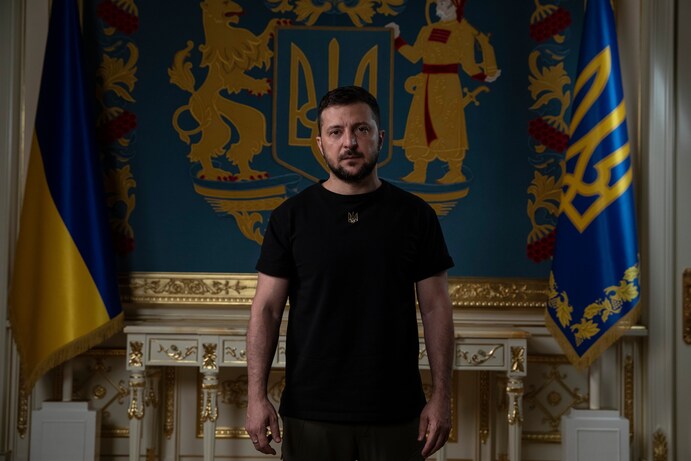Bill on mobilisation in Ukraine passed, 283 MPs voted in favour (updated 09:27 a.m.), Ukrainian media reported.
The Verkhovna Rada (Ukrainian Parliament) on Wednesday began considering an updated draft law on toughening mobilisation in the country in the second reading. More than 4,000 amendments were finalised over two months.
If the bill is adopted, all persons liable for military service must update their data in the territorial manning centre (military enlistment office) within 60 days. This requirement applies also to citizens who left Ukraine. The countdown of time will begin after the law comes into force.
If a citizen exceeds the allowed time limit, he will be held administratively liable. It is currently known that “evaders” will be fined and, at the discretion of the territorial manning centre, deprived of the right to drive a car through the court.
Ukrainians who received II – III disability group after 24 February 2022 (except for military personnel) must undergo a second medical examination. Those previously recognised as being of limited fitness are obliged to undergo a military medical commission again.
In addition, all men must carry a military ID card. Its absence will become a ground for detention by the police. During the document check, an authorised representative of the military enlistment office or a police officer will take photos and video recordings. Border guards will also have the right to check the document. The latter, thus, get new opportunities to refuse citizens to leave the country. Consular services for men 18 to 60 years of age without military credentials will be limited.
At the same time, the Rada Committee on national security and defence supported the proposal of the AFU commander-in-chief, Oleksandr Syrskyi, to exclude the provisions on the demobilisation and rotation of the military from the draft law. In his opinion, the issue of dismissal should be considered under another initiative. A proposal on the rotation of fighters will be prepared within the next eight months after the adoption of the main law on mobilisation.
Another important innovation is the authorisation to seize private means of transport from citizens, provided that a person has more than one car, as well as the approval of conscription of convicts. The only exceptions will be “persons who have committed offences against the foundations of national security, murderers, rapists and those who have committed fatal traffic accidents under the influence of alcohol or drugs”.
At the same time, only 31 of the four thousand amendments to the draft law on toughening mobilisation were taken into account. This was reported by Rada deputy Yaroslav Zheleznyak. The reading took place under extremely tense conditions. Thus, the former chairman of Parliament Dmytro Razumkov specified that the final version of the initiative appeared at the last moment.
However, the new version of the law on mobilisation specifies the categories of citizens who will be given a reservation from service in the ranks of the AFU. According to the text, published in the evening, 9 April, employees of the National Police, the National Anti-Corruption Bureau, the Economic Security Bureau and the State Bureau of Investigation will not be sent to the front line.
In addition, employees of the Ukrainian prosecutor’s office, as well as the State Service for Emergency Situations, heads of state authorities and local self-government bodies, and half of the civil servants of categories B and C will not be sent to the front line.
Employees of strategic enterprises that fulfil military orders, personnel of enterprises critical for supplying the AFU, as well as their beneficial owners (even if they do not work at the enterprise) will not be mobilised to the Armed Forces.
On the possible mobilisation of women, Oksana Grigorieva, gender adviser to the commander of the country’s ground forces, told The Times. She said:
Our Constitution states that the duty of every Ukrainian is to defend their homeland, so it will be perfectly fair if women also serve [in the army].
She noted that Ukraine should take an example from Israel and engage in military training for both men and women.
The Ukrainian Defence Ministry said in October 2023 that the number of women in the Ukrainian army had increased by 12,000 since 2021, i.e. by 40 percent. The ministry said that Ukraine should integrate NATO standards into the AFU, including in the area of gender equality.
Last week, the Ukrainian president signed a law on lowering the draft age from 27 to 25 and removing the category of “restricted fit”. The Verkhovna Rada adopted the relevant document back in May 2023, but “for many months it was lying without the president’s signature”. Valery Zaluzhny, the former head of the AFU, noted that the fitness for service should not be determined automatically by the disability group. It is the military medical commission that should give a conclusion.
Military experts believe that the president is taking these measures in the hope of receiving more weapons from Western allies, because if there are not enough army personnel, there are no weapons, and after the next amendments to the law on mobilisation, there should be more than enough new soldiers.
Since the beginning of the military conflict in Ukraine, martial law has been in effect since 24 February 2022 and is regularly extended. In February, members of the Verkhovna Rada approved a decree by Ukrainian President Volodymyr Zelensky extending martial law and general mobilisation for another 90 days – until 13 May.
